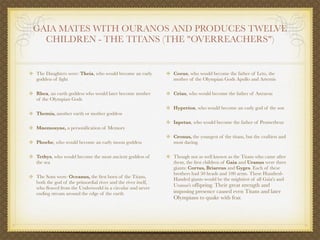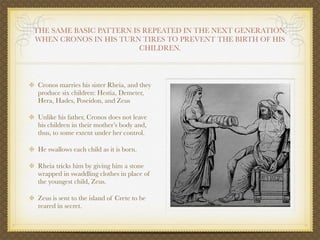The document summarizes Hesiod's Theogony, one of the oldest surviving Greek accounts of the creation of the universe. It describes how primordial entities like Chaos, Gaia, Tartarus, and Eros first emerged. Gaia mated with Ouranos and produced the Titans, but Ouranos prevented their birth, so Cronus castrated him with Gaia's help. Cronus then overthrew his father and ruled until Zeus, aided by Metis, overthrew Cronus in turn. The text explores the mythological, psychological, and sociological insights that can be drawn from the narrative of the generational struggles.











